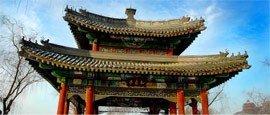Beijing History
China’s capital for the best part of 800 years, Beijing has been at the centre of empires and harsh political ideology, and is emerging as a fast-modernising metropolis.
Beijing became China's capital in 1421, a few decades after the Mongol dynasty had been ejected and the Ming Dynasty established. The city withstood incursions and fire, and held onto its capital billing throughout the subsequent Qing dynasty.
But after the imperial regime collapsed in 1911, Beijing suffered, as did the rest of China, from destructive factionalism. The Japanese invasion in 1931 was followed by civil war. In 1949, Mao Zedong's communists prevailed and the People's Republic of China was founded with Beijing regaining capital city status.
The first decade or so of Mao's rule stabilised a fearful, humiliated nation, and strong advances were made in industry, agriculture, education and health care. Beijing’s Old Town suffered though, as most of its walls, gateways and decorative arches were levelled to make way for new roads.
From the late 1950s to the early 1970s, it was the turn of the people to suffer as Beijing's ill-fated political programmes, most infamously the Cultural Revolution, saw persecution, violence and famine spread like wildfire.
Many Chinese art forms struggled to survive. Travelling theatre, music and dance groups were created to project the party's message. Plays written before the 1950s, films with human interest and the Beijing Opera were suppressed, and their creators persecuted.
Mao's death in 1976 saw the first shoots of nascent political freedom, but they culminated in the tragic events at Tiananmen Square in June 1989. Any hint of political freedoms were swiftly curtailed, but new leader Deng Xiaoping continued in his quest to open China up to the world economy until his death in 1997.
Today China's economy (now the world's second largest) continues to grow at an incredible rate. Beijing is home to an increasingly affluent middle class and a rapidly changing (if smog-ridden) skyline.
Did you know?
• At one point, around 9,000 eunuchs lived in the Forbidden City.
• Beijing has had numerous other names over the last few millennia and was known as Peking before Beijing. Its famous Peking University still uses the former name though.
• Beijing means ‘northern capital’.
Do you have any Feedback about this page?
© 2026 Columbus Travel Media Ltd. All rights reserved. No part of this site may be reproduced without our written permission, click here for information on Columbus Content Solutions.




 You know where
You know where